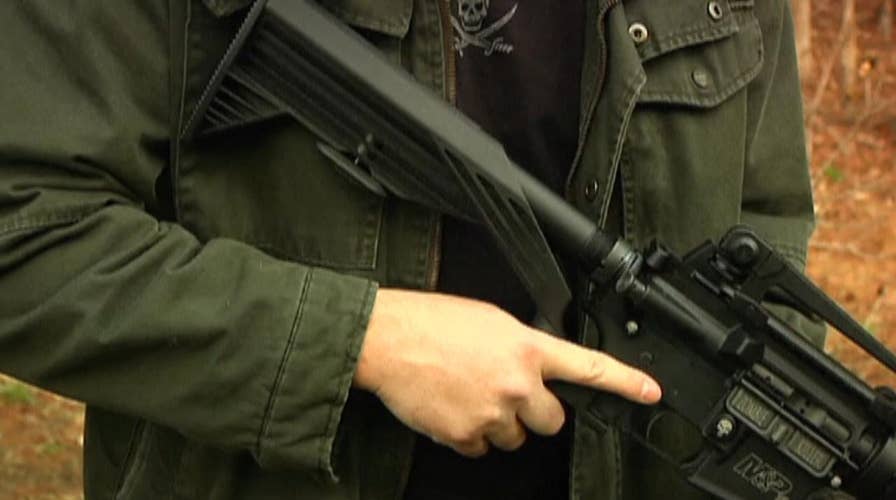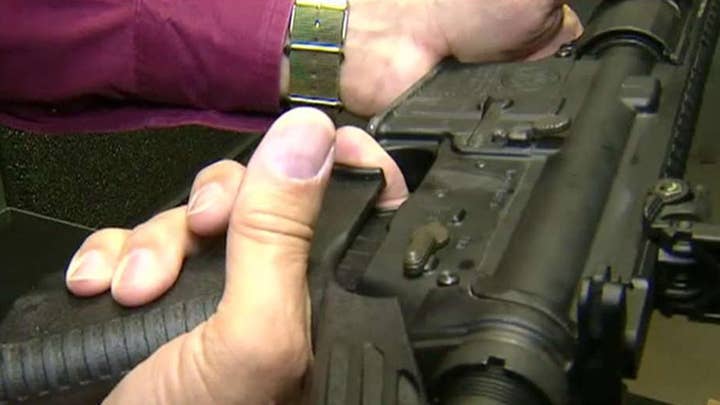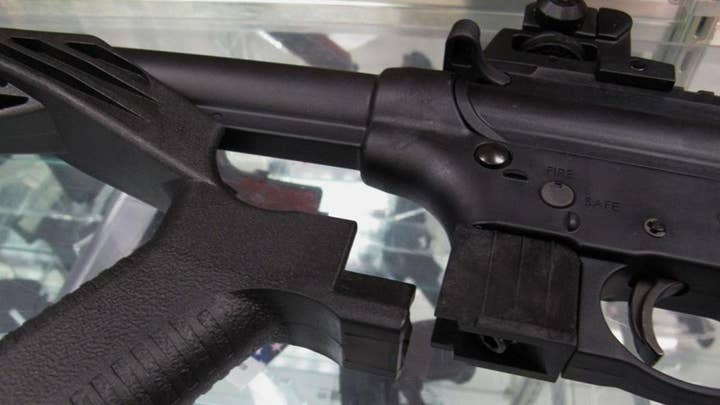What are ‘bump stocks?’
President Trump is calling for a ban on ‘bump stocks.’ Twelve 'bump stocks' were found in the hotel room of the Las Vegas massacre shooter. Lawmakers, including some Republicans are concerned about their capabilities but what are they?
A slew of cities and states have pushed to pass laws banning the so-called “bump stock” recoil devices that authorities say shooter Stephen Paddock used when he opened fire at an outdoor concert in Las Vegas, killing 58 people and injuring hundreds of others.
Local officials say they have grown frustrated with the federal government's inaction and have begun taking matters into their own hands.
But the local efforts have found mixed success.
The aftermath of the nation’s deadliest mass shooting sparked a frenzy to ban the so-called “bump stock” recoil devices Paddock used. A month after the Oct. 1, 2017 shooting, Massachusetts became the first state to pass legislation banning the device, which allows semi-automatic rifles to mimic the rapid-fire of machine guns and are currently legal under federal law.
The Massachusetts law, which went into effect last Thursday, prohibits possession of the device under all circumstances. It also bans the possession of trigger cranks.
“As of today, if you privately own a bump stock or trigger crank in Mass., you’re subject to criminal prosecution and could be up to life in prison,” state Rep. David Linsky told 25 Boston.
But Massachusetts is just one of the handful of states and cities trying to pass legislation to ban the devices.
New Jersey, as well as large cities such as Denver and Columbia, S.C., have enacted laws prohibiting the sale and possession of bump stocks.
“We are drawing a line in the sand in our city and hoping that cities and states and eventually the U.S. Congress will also seek to make these devices illegal,” Columbia Mayor Steve Benjamin told Fox News in December.
"There is no legitimate reason to have a bump stock. It is not used for hunting, it is not used for self-defense."
Connecticut, home to some of the world’s most legendary gun makers and some of the toughest gun safety laws in the nation, is among other states considering a ban.
“There is no legitimate reason to have a bump stock,” Jeremy Stein, executive director of Connecticut Against Gun Violence, told a local NBC affiliate. “It is not used for hunting, it is not used for self-defense.”
But some local and state efforts to ban the devices have either stalled or failed.
Las Vegas officials have also sought to ban the device but face a major roadblock: state law.
According to the Las Vegas Review-Journal, the Nevada Legislature passed a law in 2015 putting control over firearms, accessories and ammunition in the “exclusive domain of the Legislature,” and renders any local law “to the contrary null and void.”
“I can’t believe my hands are tied by a legislature that’s going to meet every other year,” Las Vegas City Councilman Bob Coffin told the newspaper. “This tramples on local government’s requirement to provide for the safety of citizens.”
Nevada Gov. Brian Sandoval said he would consider a statewide ban on bump stocks, however, he “believes the federal government is the best arena for these discussions because this is the jurisdiction where bump stock regulations currently exist and this would be the most direct path for a thoughtful, swift and uniform change.”
Bump stocks were originally intended to help people who had disabilities and were little known -- and little sold -- until the Las Vegas shooting. The device fits over the stock and pistol grip of a semi-automatic rifle and allows the weapon to fire rapidly, as many as 400 to 800 rounds per minute, mimicking a fully automatic firearm.
The federal Bureau of Alcohol, Tobacco, Firearms and Explosives reviewed the devices and approved them under the Obama administration in 2010.
At the time, ATF determined bump stocks didn't convert a semi-automatic firearm into one that is fully automatic, meaning it did not amount to machine guns that are regulated under the National Firearms Act that dates to the 1930s.
The National Firearms Act prohibits the sale, manufacture, and transfer of automatic weapons to the general public.
In a rare break from its traditional opposition to gun-related regulations, the National Rifle Association called for a federal review and suggested new rules might be needed.
“The NRA believes that devices designed to allow semi-automatic rifles to function like fully-automatic rifles should be subject to additional regulations,” the NRA said in an October statement.
The Associated Press contributed to this report.













































